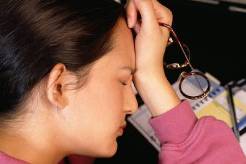Dehydration Symptoms
Mild, Moderate, and Severe
Note: As an Amazon Associate I earn from qualifying purchases.
Dehydration symptoms usually begin with the sensation of thirst and progress from there.
Years ago I assumed that if I would just drink water when I was thirsty, I would be able to stay hydrated. Bad assumption.
What I have learned since then from many of the top water experts as well as personal experience is that having the sensation of thirst means you are already dehydrated.
A shortage of water in any area of the body will trigger signals that denote dehydration.
These are the body’s first indicators of its local or general thirst.
Dehydration is often classified as mild, moderate or severe based on how much of the body's fluid is lost.
Learn to Recognize Dehydration
Unfortunately, most people simply do not understand or recognize the signs and symptoms of dehydration.
In addition, it is important to note that these symptoms may differ from person to person.
The following symptoms are some of the more common symptoms that are reported for the different stages of dehydration, according to Merck.com.
Pay attention to changes in your own body. If in doubt, call your health practitioner.
Mild Dehydration Symptoms
When the average adult has lost about two to three percent of its total body water, mild symptoms appear.
In addition to an increased thirst, some of the most common symptoms of mild dehydration in adults include:
- Headache or head rush
- Slightly dry mucous membranes
- Slightly decreased urine output
- Dark yellow urine
- Loss of appetite
- Tiredness or fatigue
- Dry or flushed skin
- Chills
- Head rushes
- Constipation
Moderate Dehydration Symptoms
If the above signs and symptoms go unheeded and fluids are not replenished, the following symptoms may begin to appear.
At this stage of dehydration, the adult body’s fluid loss reaches 5 to 6 percent.
- Little or no urine output
- Increased heart rate
- Sunken eyes
- Decreased ability to sweat
- Faster breathing
- Higher body temperature
- Muscle cramps
- Extreme fatigue
- Tingling hands and feet
- Nausea
Signs of Severe Dehydration
Total body fluid loss of seven to nine percent is critical!
The symptoms may be the same as moderate in addition to one or more of the following:
- Rapid pulse
- No tears
- Rapid breathing
- Low blood pressure
- Mottled skin
- Muscle spasms
- Impaired vision
- Shriveled skin
- Confusion
- Chest or abdominal pain
- Seizures
- Coma
Treatment for Mild Dehydration
For mild dehydration, drinking fluids is usually sufficient for treatment.
It is best to sip water or drink small amounts of fluid rather than trying to drink a lot at one time, especially if nauseous. Drinking large amounts of fluid can cause more vomiting.
Parents find it helpful to use a teaspoon or syringe when giving water or other fluids to a baby or young child.
It is also important to replace electrolytes along with water and other fluids. Simply add a pinch of salt and honey to warm water. Or make your own electrolyte enhanced water.
Avoid sports drinks which contain a lot of sugar and could cause more bouts of diarrhea.
When a young child won’t take any fluids at all, freezer pops are a temporary solution.
However, rather than buying the sugary store-bought versions, make your own with diluted fruit juice and add a pinch of salt (for added sodium).
When to Call the Doctor
According to the National Institutes of Health, you should call your doctor right away if you, your teenager or any other adult in your home has any of the moderate or severe dehydration symptoms listed above.
Further reading . . .
Mayoclinic.org; Dehydration: Symptoms and Causes
Return from Dehydration Symptoms to Dehydration Effects

If you would like to reproduce or republish this article or any other article on this site, feel free to do so but please include a reference or link to the article at WaterBenefitsHealth.com.
Sign Up for Our Monthly
Newsletter
Visitor Comments
"This was the best and most straight forward info on the net yet. I asked a question and got an answer that made sense. Thank you so much!" - Linderlinder
FINALLY!!! I have been wondering about this for years with no 'solid' answer. This is exactly what I've been wanting to know! Thank you for this share..." by Andy
"Thank you for the information, Nancy. I appreciate it. Your article and findings are very helpful, referring to dehydration." - Carolyn
"Lemon water is one drink both my wife and I can't drink. It upsets our stomachs. We are in our sixties and in very good health—well, better health now that we drink about 2 liters plus of water each day. It has made so much difference to our digestive systems and recovery every day. Thank you for your website and effort." - Rod



